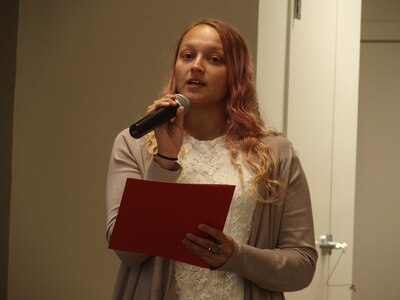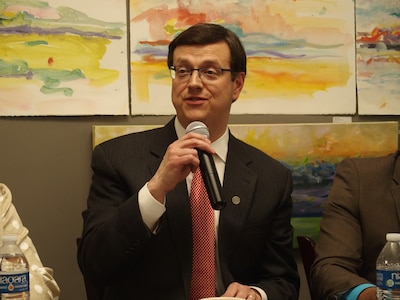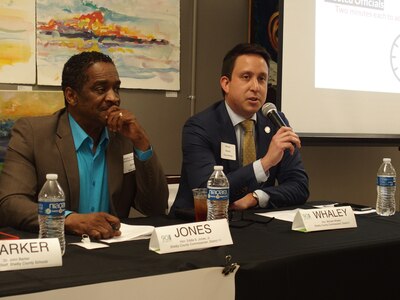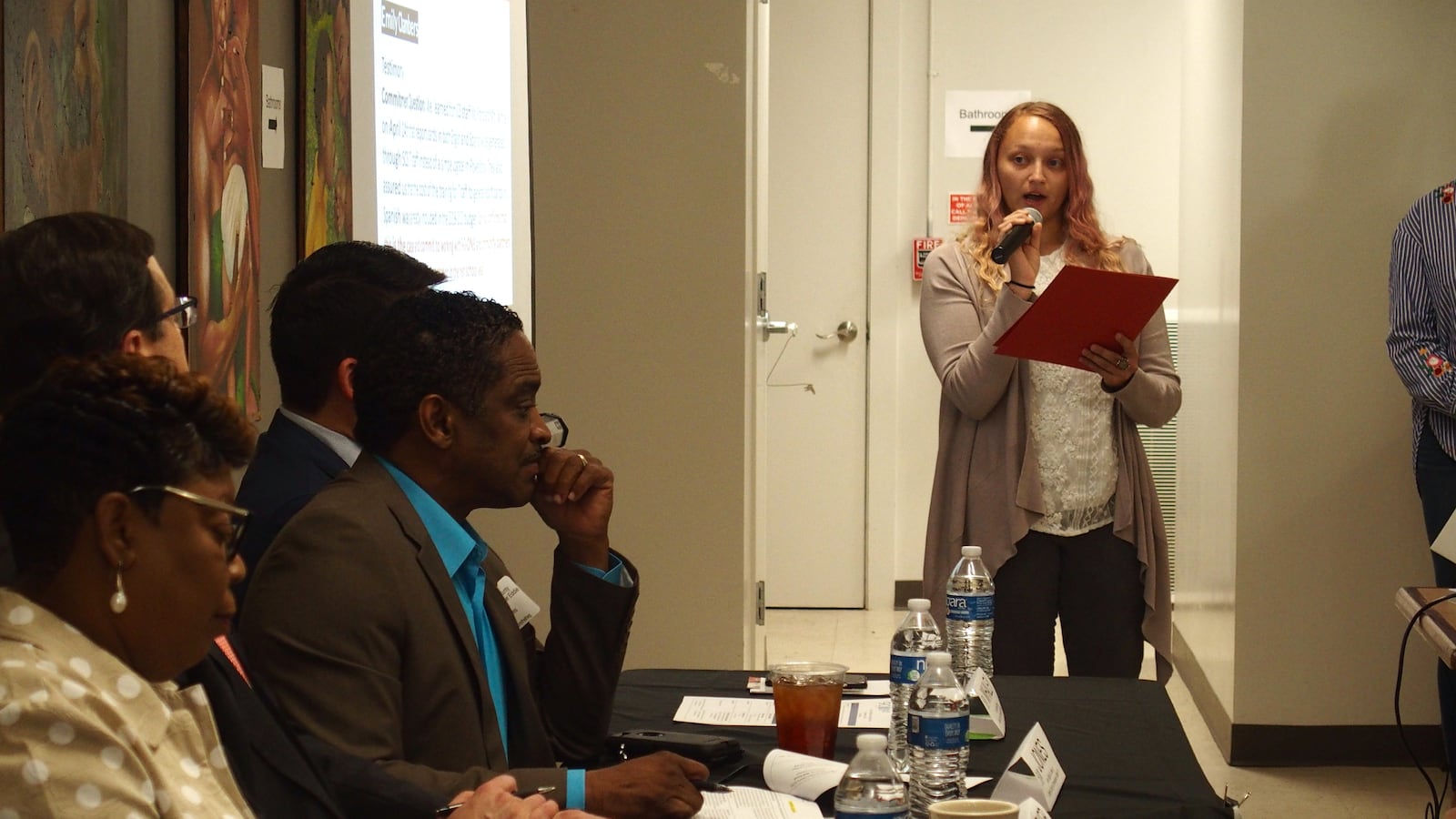A group of Memphis teachers pushed district and county leaders Tuesday for report card translations, additional support staff to help traumatized students, and more modern school buildings. Their efforts to secure resources for Shelby County Schools come in advance of an expected school board vote on a spending plan. That vote could take place as soon as next week.
The budget is the first under the district’s new superintendent, Joris Ray. He had served in an interim capacity for three months before the school board unanimously voted him in last month.
“Our students deserve schools that focus on the development of the whole child, how to self-regulate, and how to cope with the experiences they walk into the school building with every day,” said Andrea Fulgiam, an English teacher, said at the meeting. The gathering, which drew about 40 people, was held at Caritas Village, a community center in Binghampton.
The lead organizer of Tuesday’s meeting was 90-One, a teacher-led Memphis advocacy organization that began in 2016. The group is overseen by Leadership for Educational Equity, a national nonprofit composed of Teach for America members and alumni. The advocacy groups MICAH, an interfaith coalition, and Stand for Children were also event hosts.
The Shelby County Schools officials and county commissioners present said they agreed with the teachers’ requests in principle, though they sometimes differed on the specifics. The meeting at times grew tense as advocates pushed for “yes” or “no” answers, and some officials continued to explain their stances before the time they were allotted to elaborate.
District officials gave some preliminary priorities and numbers in March. Read more.
Shelby County Schools is about a month behind previous years in presenting a budget proposal, but board members will get the full proposal this week, said the district’s chief of staff John Barker. A vote on spending could come as soon as Tuesday, when the board plans to hold a special meeting, he said. The district last week held sparsely attended community meetings on preliminary budget priorities that were announced a few days prior.
The district is scheduled to present its budget to county commissioners, the local funder for schools, on May 29.

What follows is a summary of the topics discussed at Tuesday’s meeting. The district and county officials in attendance were Barker; Althea Greene, a school board member; and Eddie Jones and Michael Whaley, both county commissioners. Organizers of Tuesday’s meeting said they would review the district’s proposed budget when it is released and either endorse or reject it.
Translating report cards into Spanish
Emily Chambers, who teaches English as a Second Language at Cordova High School, said the district has a long way to go to serve parents who are not native English speakers.

“I constantly hear teachers complain about the lack of parental involvement in students’ education, especially with high schoolers. How can we expect parents to be involved if they have no means of understanding the materials distributed by the school?” she said before asking school officials to answer with a simple “yes” or “no” on whether they would support ensuring translation services for report cards, beginning next school year.
“You can expect to see those report cards in Spanish,” Greene replied, noting that the budget includes funds toward this end.
The share of students learning English has steadily increased over the past decade in Memphis schools from less than 5% in 2007 to about 8% last year, when there was a slight dip. Most are Spanish speakers but many are refugees from elsewhere, officials have said.
The district has strengthened its services for Spanish-speaking parents and students in recent years through translation support, community outreach, and an academy to help newcomer high school students transition into classes. But the district is still under investigation by the U.S. Department of Education following 2016 allegations that officials were diverting migrant students to adult classes rather than enrolling them in traditional high schools.
Dealing with effects of trauma in the classroom
Meili Powell, a third grade teacher at Dunbar Elementary School, shared a story of a student who witnessed his cousin get shot earlier this year and has had a quick temper ever since. His behavior has led to several in- and out-of-school suspensions.
“Even though he has verbalized to me and other adults in our building that he cannot control his anger, I constantly see him and too many other of my students use the only coping mechanism that they know and consequently get penalized for untreated trauma,” Powell said.
“They return with no fundamental change except for missed learning,” she continued. “They need to know that discipline is not the first and only answer to their trauma.”

The statistics around attendance, discipline, and trauma have sparked several initiatives across the district in recent years. About 13% of Shelby County Schools students were absent 18 or more days during last school year, according to state data. About one in nine students were suspended from school last year, which is double the state’s rate. And about 37% of children in Shelby County have experienced two or more traumatic events, such as abuse, witnessing violence, or the death of a family member; that’s higher than the national average, according to the 2016 National Survey of Children’s Health and the Data Resource Center for Child & Adolescent Health.
The teachers group requested 30 family engagement specialists that would help reduce suspensions and boost attendance. They also asked the district Tuesday to launch a 10-school pilot program that would include a curriculum focused on emotional skills and training for staff.
Greene noted that training to identify and deal with childhood trauma is already underway in Shelby County Schools. Separately, the state launched training in 10 Memphis schools this year and the district has hired about 30 behavior specialists to prevent suspensions and transition suspended students back into the classroom.

Without committing to the pilot program suggested by the group, Greene said the board wants to make sure that all district workers who come in contact with students — “from the cafeteria worker to the custodial worker to the bus driver” — get training on childhood trauma.
Barker pointed to an upcoming initiative to reduce disparities between black boys and their peers as an alternative to hiring family engagement specialists.
“What I want you to know is in answering these questions, absolutely and positively, we hear you, but specific kinds of asks… may not necessarily be the strategy that we’re using,” Barker said.
Building better school facilities
Event leaders, district officials, and county commissioners were quick to agree on the state of school buildings in Memphis: terrible.
“Across our city this year, we have seen school canceled because of outdated equipment and because of pest and rodent infestations,” said James Aycock, a charter school administrator who has a daughter at Snowden, a district school. “Sometimes [at Snowden] you can smell the plumbing issues. You can see evidence of water damage.”
Related: Kirby High students to return to school Monday four months after rats moved in

Former superintendent Dorsey Hopson left a plan that would consolidate 28 aging buildings into 10 new ones. Ray has been hesitant to endorse the plan and has said he will first lead community meetings to gather input. But Aycock said the plan and the district’s $500 million list of deferred maintenance needs only scratches the surface.
“It doesn’t even begin modernization to meet 21st-century standards. The current plan only addresses a small fraction of the more than 200 schools in the district,” Aycock said.
Barker did not specify a timeline for a more comprehensive plan, but assured the crowd that one is coming. “What we know is that there were ideas that were espoused in that need to be re-looked,” he said.
Whaley, the county commissioner, said there will have to be tough decisions ahead, which could include more school closures, on top of the more than two dozen that have taken place in recent years.
“I think for too long we’ve spent funds on deferred maintenance and patching Band-Aid solutions, right?” Whaley said. “There comes a time when we can’t keep doing that. … And the fewer dollars you’re spending on deferred maintenance, the more dollars you’re spending in the classroom.”

